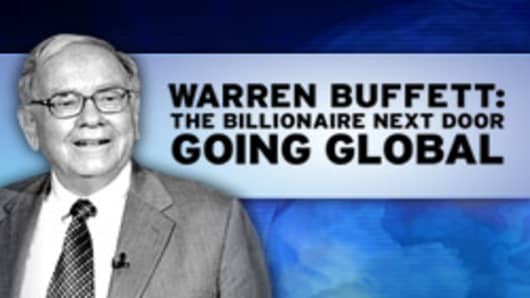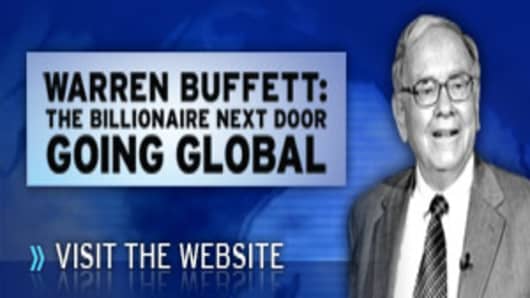This is Part Two. (The first portion appears in this previous WBW post.)
In this section, Buffett starts by showing Becky a photo of the original Berkshire mill, which leads to a conversation about how even strong companies can fall behind in an ever-evolving world.
Buffett: The picture of the Berkshire is right here. Here we are. Nice orderly office, and right up there is a photo of the big Hathaway Mill in New Bedford, Mass. That was there in 1960, well, I bought the first stock in '62, then in '65 when I took control, now it was over a million square feet. It had probably 50 million dollars of replacement value of machinery and equipment in there. When we finally gave up on the textile business 20 years later, we got less than $200,000 sold for scrap iron. And for that building which is over a million square feet, I got minus $250,000. I have to give up money. So that's, it shows you that gap accounting figures and fixed assets and all that, really don't mean much. It's much better on the Coca-Cola trademark than it is on a bunch of buildings and machinery.
Becky: You know, I never thought about it before, but part of what we're focusing on is just the idea of you going global and looking around and that's an early example of globalization and how it changed your investment theory.
Buffett: In the early, a century plus ago, if you lived in New England, you measured your wealth by looms and bobbins just like people in the Midwest measured their wealth by acres of land. And it turned to dust, basically.
Becky: Is it? You think it continues to do that in other industries today?
Buffett: It's, the world is always evolving. You know, I mean the job of a, somebody that allocates capital is to look out and see not so much, in my case at least, where the world was going but to make very sure that you know what the world is leaving. We like what we call durable competitive advantage. That company did not have, it had great workers, it had perfectly sound equipment. It was making something essential, men's linings and cloth for handkerchiefs and that sort of thing but it did not have any durable competitive advantage. And eventually it disappeared.
Becky: What industries today do you think are disappearing in that way?
Buffett: Well, you have to think about any industry that has a high labor cost. Because we are at a competitive disadvantage in the United States with industries with high labor costs. So if, there are probably exceptions, I mean they're not going to print the Wall Street Journal from China or India or something of the sort. But if you've got a business with a high labor content that's churning out kind of a basic product, you have to think twice about what's gonna happen to it. I was wrong in shoes, went into the domestic shoe business. I was dead wrong because this moved. And then in textile business, we're buying our furniture over there. Now we retail it, we don't manufacture. A domestic manufacturer has a terrible time now compared to 10 years ago. There's a lot of labor there and they're good.
Becky: Irv (Blumkin, Chairman and CEO of Nebraska Furniture Mart) said something today that kind of struck me. He said in China now, they're losing some of their factories. They're going offshore to Vietnam, cause it's cheaper labor there.
Buffett: That's capitalism. Even in a communist country that's capitalism. The world will seek low cost production as long as the quality is thought to be fine. And we want to be very careful if we're looking at a business if it's got a 40% labor content. Why is it here and what will keep it here? It won't be because we know something they don't know. I mean the Internet, all kinds of things. The world has gone flat in that respect. And so if you're looking for durable competitive advantage, I mean you're always looking for the chinks in the armor. Something that can cause a business that's good today not be good 10 or 20 years from now. You know, that's a prime example. That business, back right before World War Two, was making as much money as, almost any pharmaceutical company you can name. It was big, but no more.
Becky: What about a pharmaceutical company or something? Is that different because you need high quality controls, or...?
Buffett: Pharmaceuticals are different. The labor content is not big there. It's the quality of the research and that can take place anyplace. There are major pharmaceutical companies outside the United States that do well. But we will not lose our pharmaceutical industry because of low-cost labor someplace.
Becky: Now this, is something you received in South Korea.
Buffett: That's correct. The hospitality there was just terrific. I mean, the mayor, from the time we arrived to the time I left, I mean, he went out of his way. And he understood, we had never met before, but he understood Americans and he understood me. We got along terrifically and he's got a city he should be very proud of.
Becky: And I missed when he was giving this to you. What does this represent? Do you know? It's a gold crown but I couldn't remember exactly what it was. Oh wait, it says right here. National Treasure number 87. Never mind that doesn't really tell me what it is.
Becky: That's really beautiful. What did you think of South Korea? That was your first time there.
Buffett: Well, it was my first time there and I was really bowled over just like I was, frankly, in China too. But here was a city I really didn't know anything about. I knew something about the Korean economy because I had this investment in Korean stocks, I knew the rapid strides it had made. But when we saw our factory there, whatever it may be, the mayor, it's just, you know, it's the place to be.
Becky: It was a beautiful country too, I didn't realize how hilly it was, when we flew in over.
Buffett: Didn't they say it's something like two-thirds hills or something?
Becky: 70% they said.
Buffett: Here we have, what do we have? 60 or 70 acres, that's scarce stuff over there.
Becky: Who are all these pictures of?
Buffett: These are the, most of the managers, and these are the heroes and heroines of Berkshire Hathaway. These are the people who I tell them their only job in life is to make me look good, but that's a tough job. But they do it. They run the businesses for us. They're out there everyday, tackling all sorts of problems. You know, personnel problems, customers, suppliers, all kinds of things. And they do it and they just tell me what they've done and then I write it up as if I'd done it.
Becky: Have you checked back in with Irv or talked to any of the guys since they got back from China?
Buffett: I haven't talked to them.
Becky: It was interesting to hear today how they made it through the rest of the thing. And he pointed out again that you just let them do their thing.
Buffett: Yeah. Well, I'd be crazy if I didn't. And we get a lot of schools that come here and a lot of them bring footballs. I'm ready to open up a sporting goods store. They bring a lot of nice things, I mean, sometimes they're very imaginative about the things. The University of Nebraska at Lincoln came the other day. They brought me a special book they'd made up about when my dad and my mother, who were both there, when they were at the Daily Nebraskan, the paper, and how they met there. And then they gave me all the pages when my dad was the editor. It was really nice but a lot of them do things like that. They're very imaginative.






